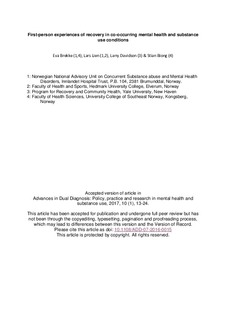First-person experiences of recovery in co-occurring mental health and substance use conditions
Journal article, Peer reviewed
Accepted version
Permanent lenke
http://hdl.handle.net/11250/2503505Utgivelsesdato
2017Metadata
Vis full innførselSamlinger
Originalversjon
Advances in Dual Diagnosis: Policy, practice and research in mental health and substance use. 2017, 10 (1), 13-24. 10.1108/ADD-07-2016-0015Sammendrag
Purpose The purpose of this paper is to explore and describe experiences of recovery among people with co-occurring mental health and substance use conditions (co-occurring conditions) in a rural community in Norway. Design/methodology/approach In-depth individual interviews with eight persons with co-occurring conditions were conducted, audiotaped, transcribed and analysed using a phenomenological approach. This study is part of a research project investigating recovery orientation of services in a Norwegian district. Findings The analysis yielded four dimensions of recovery: feeling useful and accepted; coming to love oneself; mastering life; and emerging as a person. Insecure and inadequate housing and limited solutions to financial problems were described as major obstacles to recovery. Research limitations/implications Further research into the facilitation of recovery as defined by persons with concurrent disorders is needed, particularly regarding the facilitation of community participation. Practical implications This study supports an increased focus on societal and community factors in promoting recovery for persons with co-occurring conditions, as well as service designs that allow for an integration of social services and health care, and for collaboration among services. Social implications The results suggest that the community can aid recovery by accepting persons with co-occurring conditions as fellow citizens and welcoming their contributions. Originality/value The paper provides an enhanced understanding of how persons with co-occurring conditions may experience recovery.
